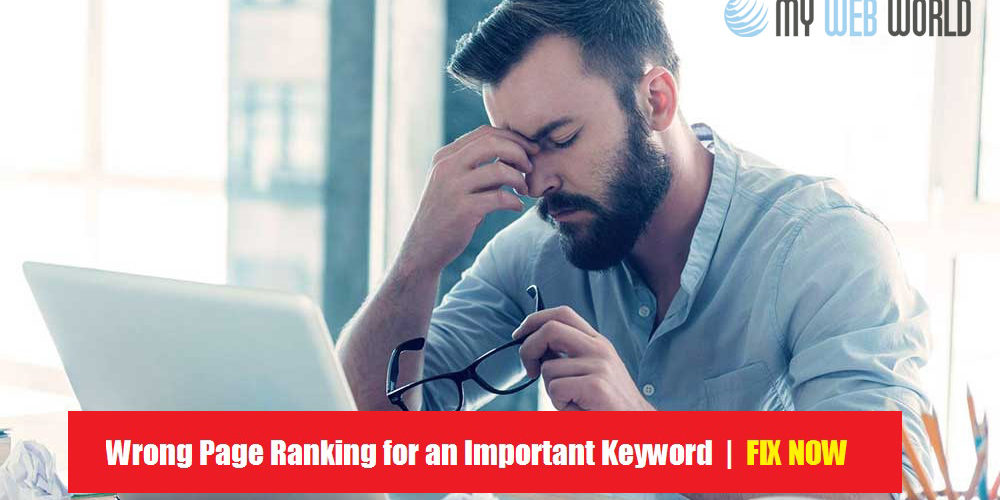Let’s assume that your site has ranked for a keyword you’ve aiming. This is brilliant news, right? Of course, it is! But what if the page that is ranking finishes up being unrelated.
You certainly met something like this when you googled something – the first few outcomes that came up looked feasible, but for other reason, one of the top labels didn’t look like a good fit. If the page doesn’t reply to your query, that means the wrong page is ranking for that particular keywords, and it is generally not intentional.
This is not a good sign, because if the page presented does not effectively represent the query, then
1. It can adversely affect your click-through rate and conversion rate and traffic because of an unsuitable title or description.
2. Receiving the wrong page and not finding relevant things, your newly-arrived persons are likely to jump out from your site without converting.
So, what should you do? Here’s the thorough process to analyse, recognise and fix the issues as soon as they arise.
Recognising the wrong ranking pages
Sometimes it’s impossible to regulate each and every of your site’s ranking pages. And at times you just don’t have any information about the site. So, to initiate, you need to analyse if there are any wrong page issues to be fixed.
Just choose how many keywords you’d like to review. Analysing all pages ranking for your 1500 keyword queries are something you maybe can’t afford and also don’t need. So, we’ll choose only the inquiries those are vital and the ones that can drive you the most traffic.
- Detect your most valuable Google queries.
- Check which pages rank for your most important queries.
- Analysis the ranking pages to see if they are the ideal pick for the queries.
Detecting the fundamental issue
Now from where to improve, let’s grasp how you can do that. And meanwhile there can be a number of reasons that cause the problem, you need to go through them step by step.
1. Are there any technical/quality problems that inhibit the preferred page from ranking high?
You have a proper page to match the query but it still doesn’t rank may be because:
- The page is blocked from search engine bots.
- The page has insufficient/low quality/poorly optimized content.
- The page has not enough external links.
- The page has not enough internal links.
2. Do you even have a page that exactly matches the given keywords?
If you don’t have an enhanced page to rank for the keyword, Google will rank the most appropriate selection it could find. Hence, you probably know for sure if there is a proper web page on your site.
3. Are the page rankings being cannibalized by another page of yours?
This can be the possible issue, in Google’s senses, a sum of your sites pages are related to the same query and most probably the ranking capability of the right page is overcome by another, less appropriate but more influential page of yours. Now that we’ve spotted the case of page and to avoid cannibalization here are the some possibilities you have:
- Re-point internal links
- Request some external link deviations
- Re-point redirects
- Take away keywords and related terms
Maintain safe future of your website
Now, all of the above practices will help you detect and correct the page ranking issues. Now your next step would be to consider an appropriate keyword planning for your site and get into the routine of observing not only rankings but your ranking pages also.
- Keep on monitoring
However optimizing your pages according to a well-organized keyword map will decrease the probabilities of a wrong ranking page encountered in Google but, sometimes things just don’t go as considered. Though now that you have your keyword map set up, you can easily distinguish the wrong page issues.
- Construct a keyword map
Keyword mapping is the method where you choose which pages will be optimized for each of your keywords.
On the one side, a keyword map helps you escape from more cases of cannibalization and confirm that the keywords are used steadily, and all your landing pages rank for the relevant keywords. On another side, it also makes it easier to notice page-specific issues.
- Quality Back links using Social Media
For many years, link building was crucial for search-engine position. With integral authority, social media sites are the flawless platform to create the high-quality link-backs your websiteessentials for particular keywords.
Content that’s shared through links across social media helps search engines understand how to rank your website for exact keyword phrases. So, you should aware of how to use Social Media to improve your online presence.
Thus, this is the procedure you can use to make the most of your current Google rankings, increase your website traffic and conversions rate. Do let me know if you have any follow up question on this.







